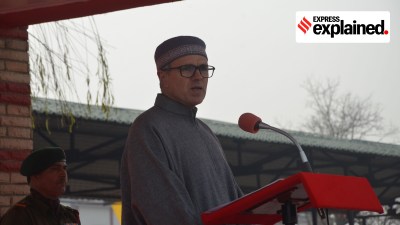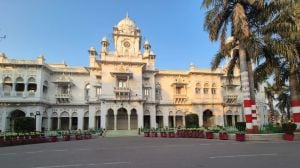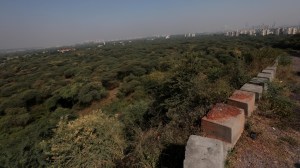A new aggression now
Unlike the Hindu and Christian traditions, sensual pleasure in this world is commended in Islam when it occurs within the bounds of legitima...

Unlike the Hindu and Christian traditions, sensual pleasure in this world is commended in Islam when it occurs within the bounds of legitimate union. The pursuit of pleasure within the defined limits is indeed enjoined by Quranic verses and by the statements of the Prophet. A number of pietistic texts repeat the contention that sexual pleasure in this world is merely a foretaste of pleasure to come in heaven. All in all, paradise is the realm of pleasure so accentuated as to be perpetual and consummate, so much so that it is said that the Blessed do not sleep, for fear slumber may divert them from their pleasurable occupations.
Tired by the coverage of America8217;s sabre-rattling and arrogance over Iraq and weary of the murky happenings back home, I turned to the Muslim Paradise narratives in the Arab world. I scratched my head to recall what the Urdu poet Mirza Ghalib had to say on the subject. My reading sensitised me to our appalling ignorance of the variety of views and interpretations of Islamic tenets.Those of you who are sometimes swayed by the Islamists or the Hindu polemicists are probably not even aware of the disjunction between the formal ideology of Islam and the day-to-day beliefs and practices of Muslims. Many do not recognise the simple fact that large segments of the Muslim population have been integrated with other communities and that their views and responses are far more complex and diverse than the statements found within the corpus of received opinions on the subject.
Secondly, there are lessons to be learnt from the ease with which some sections of the Muslim intelligentsia in the second-half of the 19th century questioned and challenged inherited knowledge and conventional wisdom. Ghalib and Syed Ahmad Khan, who pioneered the Delhi Renaissance, were among the many outstanding individuals to do so. Sadly, the India of their days is not the same any more in this respect. Can we deny that as a nation today we are far more narrow-minded, conservative and intolerant than ever before? Thisis not the occasion to lament or bemoan the decline in our intellectual values, but I certainly want to ask in passing why a 16th-century mosque was destroyed in broad daylight? Why was the liberal viewpoint on the Shah Bano issue stifled by the weight of Muslim orthodoxy? Why was a professor banished from his university for over four years?
To illustrate Ghalib8217;s notion of Paradise, I quote just the three verses; the rest is left to your imagination
Hum ko maaloom hai jannat ki haqiqat, lekin/dil ke khush rakhne ko Ghalib ye khayal achchha hai
I know the truth, but, be that what it will,/The thought of Paradise beguiles me still
Sunte hain jo behisht ki taariph sab dursut/lekin, khuda kare wo tera jahwa-gaah ho
All that they say of paradise is true, and yet/God grant it be illumined by your radiance.
And, on a lively note, notice the following.
Wo cheez, jis ke liye hum ko ho behist aziz/sewaye baada-i gulfaam-i mushkboo kya hai?
For what else should I valueParadise/If not the rose-red wine, fragrant with musk?
Nobody knows whether Ghalib is enjoying his red wine or not, but we are certainly regaled by his exquisite poetry, his distinctive style, his universalism and humanism, his defiance of authority, his repudiation of established traditions and conventions, and his irrepressible and unabashed sense of humour.
Born exactly two centuries ago in Agra but settled in Delhi at the age of 15, Ghalib did not write for a Muslim audience or an Urdu-speaking readership. These distinctions did not matter to him. He took pride in not being shackled by religious dogmas or traditionalism, and paid scant regard to the outward observances of Islam. His broad and tolerant attitude is shown in his letter to Munshi Hargopal Tufta: 8220;I hold all mankind to be my kin, and look upon all men Muslim, Hindu and Christian, as my brothers, no matter what others may think8221;. He wore no sectarian badge, no sectarian colour. In fact, at his his death there was some confusion as towhether his funeral rites should follow Sunni or Shia rituals.
The poet revelled in being eclectic and independent in his outlook and unorthodox and unconventional in his views. He could thus demand from God treatment consistent with his self-respect and question why, in the Islamic tradition, the written testimony of the angels and not the witnesses8217; defence would be accepted on the Day of Judgment.
The angels write, and we are seized. Where is the justice there?/We too had someone present when they wrote their record down.
The implied criticism of, and the lack of reverence for God, was the hallmark of Ghalib8217;s prose and poetry. Once he was looking at the sky and was struck by the apparent chaos in the distribution of the stars. He said: 8220;There is no rhyme or reason in anything the self-willed do. Just look at the stars scattered in complete disorder. No proportion, no system, no sense, no pattern. But their King has absolute power, and no one can breathe a word against Him8221;. Yet nobody among hiscontemporaries issued a fatwa against him. Nobody condemned him for his scepticism. When he died on 15 February 1869, large numbers of people, Hindus, Muslims, Shias and Sunnis, took part in the funeral procession.
The poet who had 8220;brought the love of poetry with him from eternity8221; hoped that 8220;My poetry will win the world8217;s acclaim when I am gone8221;. His confidence has proved to be well-founded, though he has not earned the same degree of recognition which his achievements merit. Perhaps his bicentenary would have been celebrated with greater fanfare if he had been born in Calcutta, Bombay or Pune. Perhaps he would have been better known if he had not written in Urdu, a language that languishes in the lanes and bylanes of Muslim localities. Ideally, a nation in search of composite symbols and eclectic traditions should have appropriated a poet of Ghalib8217;s stature. Instead, he has been conveniently passed on to, and his fate sealed by, heads of various Urdu Academies.
- 01
- 02
- 03
- 04
- 05































